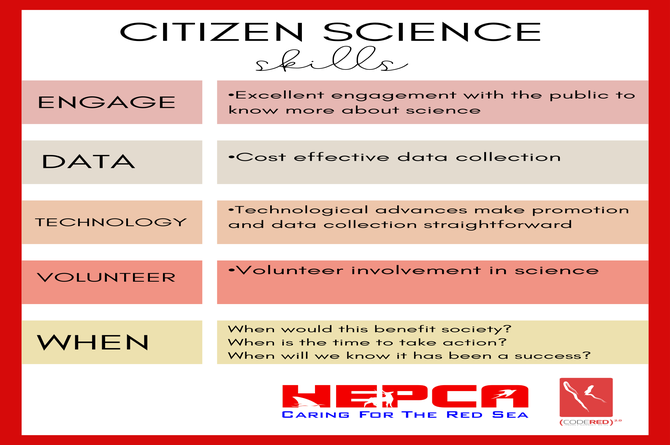Citizen science approach for conservation in the Red sea
There’s always a question about where did we get our knowledge and so many philosophers exert much time in investigating this part. By applying many definitions to this question it’s answered by experience we can get knowledge and experiences are part of the 5 senses that could be combined to get us to absorb meanings and get this to be applied in many fields. This knowledge dilemma brought to the table of science that every one of us can be a scientist and contribute to the data collection about surroundings.
Being a citizen scientist carries many benefits for the Red sea conservation initiatives as:
-
Sharks project: for documenting sharks' geographical sites to build site conservation plans.
-
Samadi Dolphin house: for recording a management plan for the dolphin’s site in Samadiand recording day-to-day basis the visitors count to better apply the plan of conservation and know the pattern of dolphin’s life in the site.
-
Turtle watch: designed to document turtles' nesting sites and the anthropogenic impacts on turtles.
-
Pollution spotting: Documenting sites of oil pollution, plastics, and any harassment violation in the wild.
-
Stranding/ Mortality of mammals: locating any stranding/ mortality event for mammals megafauna all along the Red Sea coast.
-
Bleach watch: for documenting coral reefs and the bleaching events that happened in the diving sites.
For working as a citizen scientist now, one should start looking around for everything, know the basic taxonomy of animals, take photos, be involved in science communities, sound recordings, location detecting, etc.
As there’s a lot that happened in the surrounding environment and this got us to start looking at the patterns and getting purposeful recommendations for conservation considerations in certain sites.
HEPCA opens platforms for citizen scientists to engage more people in conservation and reporting violations, this way of engagement created the community-based monitoring for environmental resources and also connected a community for science and people who engaged in the activities for future conservation.
If you would like to engage with us in any of the Red sea watch (citizen science), you can reach us out in the following channels.
Facebook: https://www.facebook.com/HEPCA
Instagram: https://www.instagram.com/hepca_org/
LinkedIn: https://eg.linkedin.com/company/hepca



